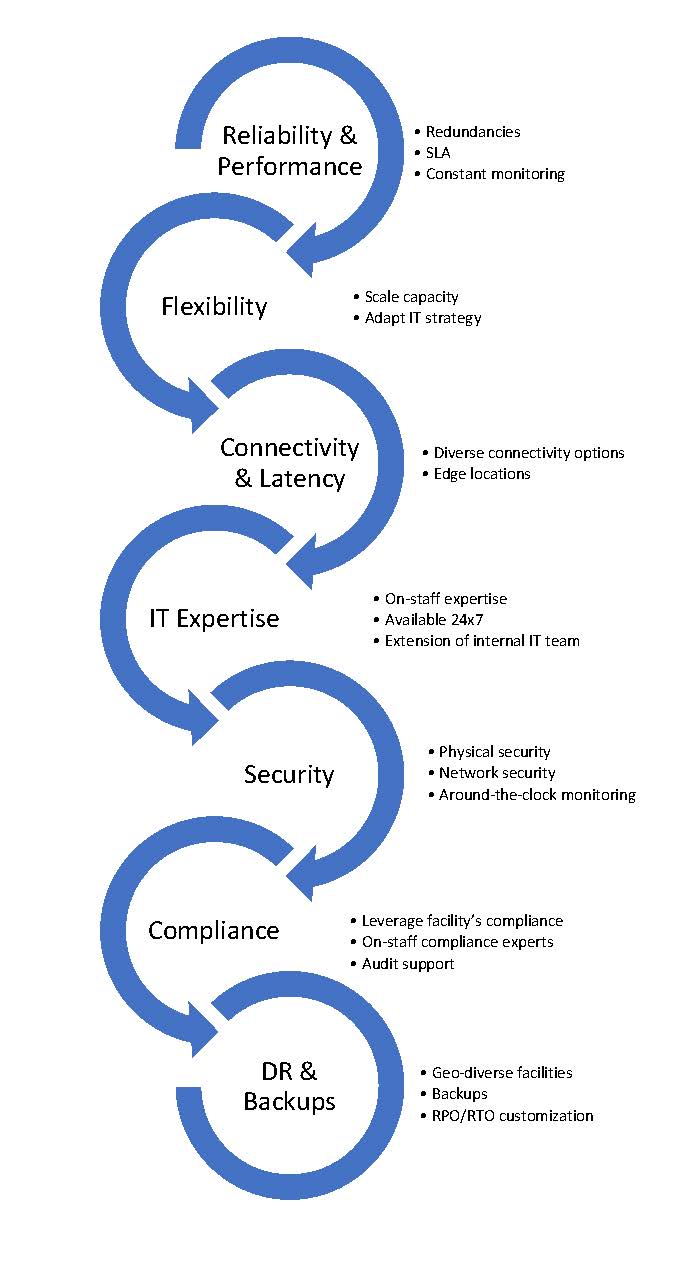
Why Choose Colocation? Here Are Seven Good Reasons
Colocation data centers offer an outsourced solution that enables organizations to remain focused on their core businesses, rather than data center management.In a data-driven, highly connected world, organizations require an IT infrastructure that can deliver access to data and applications quickly and reliably to promote effective operations and customer engagement. Data centers are at the heart of this delivery because they house the necessary hardware, networking and critical systems to effectively operate the IT environment. However, building, managing and maintaining a secure, reliable, high-performing data center is challenging, and many organizations lack the capital, skilled personnel and time to do it on their own.

What Are Colocation Services?
Colocation allows organizations to rent space, power and interconnection for their privately owned servers and networking equipment from a data center. By contracting for only necessary colocation services, organizations control costs and avoid the hefty investment that comes with building and operating a data center.
With colocation, the data center provider manages and maintains the facility’s critical systems, including power and cooling, connectivity options, carrier relationships, physical security, uninterrupted power supplies (UPS) and backup generators. By sharing the operational costs with other tenants, organizations have access to highly reliable, enterprise-grade features they likely could not afford on their own.
Colocation facilities are also regularly upgraded to support intensifying IT requirements and data processing demands. This is particularly relevant as organizations increasingly utilize artificial intelligence (AI) and machine learning, which have intense computing demands and require low-latency networking.
Colocation Improves Reliability and Performance
Organizations simply cannot tolerate downtime. Colocation employs a series of redundancies –including redundant power and cooling systems, multiple power feeds, UPS, emergency generators (with fuel reserves), diverse carrier access and physical connection points – to ensure resiliency. The level of redundancy varies by facility, and organizations should confirm that a facility’s redundancy tier level aligns with their needs before engaging a provider.
Colocation providers build facilities for reliability by anticipating or avoiding threats that can jeopardize availability. Many data centers are hardened to endure seismic activity, hurricane-force wind and other severe weather events. Recognizing that accidents happen, colocation facilities also utilize well-designed and tested emergency preparedness plans to quickly and effectively respond to unplanned disruption. To support availability commitments, colocation providers generally offer an uptime service level agreement (SLA).
Trained data center facility teams also support operational reliability by constantly monitoring equipment performance and conducting regularly scheduled maintenance and equipment refreshes. This is an important differentiator compared to on-premises facilities, where maintenance and upgrades can be delayed as IT teams focus on business-driving IT initiatives.
Colocation Enables Flexibility
IT demands are always evolving in response to business growth, emerging technology, new compliance requirements and shifting customer expectations. Colocation provides the flexibility to help organizations adapt their IT infrastructure to keep pace with these changes. As organizations grow – whether organically or through merger and acquisition – colocation allows them to scale their physical footprint, power capacity and IP bandwidth to meet new requirements while paying only for necessary capacity.
Organizations can also leverage colocation to adapt their IT strategies to integrate additional deployments or support repatriation. Through the colocation provider’s portfolio of services, organizations can introduce additional colocation sites, cloud infrastructure, disaster recovery (DR) solutions or other services to build a hybrid IT strategy.
Connectivity and Latency Are Improved
Today, customer experience is paramount, making connectivity an increasingly essential piece of the business strategy. With colocation, organizations have secure access to a growing selection of connectivity options, including multiple internet service providers (ISP), carriers and cloud providers—without building and managing the necessary connections and relationships.
With a portfolio of geographically dispersed facilities, colocation providers also support latency requirements by allowing organizations to choose a facility near their headquarters. For ultra-low-latency delivery, organizations can leverage edge deployments to place their infrastructure closer to their end-users
You Have Access to IT Data Center Expertise

Given the existing IT workforce shortage, hiring and retaining IT professionals is increasingly difficult and expensive. Colocation provides access to a team of certified experts. In addition to continuously monitoring, managing and maintaining the data center, these IT professionals serve as trusted advisors and extensions of customers’ IT teams to help devise, adapt and manage their IT strategies and deliver remote hands support, as needed.
Colocation professionals are also singularly focused on data center operability, giving them greater access to innovative technologies and forward-looking best practices. Plus, with the colocation team managing the data center, organizations can dedicate their internal IT teams to projects that meet employee needs and improve customer experiences.
Data Centers Offer Superior Physical Security
As cyberattacks continue to grow, organizations are taking a hard look at the physical and cybersecurity postures. Colocation offers robust physical security – including perimeter fencing, biometric scanners, man traps, multi-factor authentication, perimeter and interior cameras and around-the clock surveillance by trained security personnel – to ensure only authorized individuals can access the data center and customers’ hardware. To protect their networks, colocation data centers also employ the latest firewall technology, 24x7x365 monitoring, DDoS protection and other logical security protocols to detect and mitigate issues. This level of control is hard for an organization to achieve on its own.
Data Centers Help with Compliance
As digitalization and data continue to amplify, more regulations and standards are introduced to protect operational and data integrity. These compliance requirements are increasingly complex and rapidly change to address new threats and technological developments, making it challenging for organizations to keep up.
Through multiple layers of security and reliability protocols, most colocation facilities are compliant with SSAE 18, ISO 20000-1, ISO 27001, SOC 1 Type II, SOC 2 Type II, SOC 3, HIPAA and PCI-DSS. Although organizations are ultimately responsible for their own compliance, they can leverage the compliance of the colocation facility to help achieve their own. Additionally, colocation providers employ compliance experts that can offer audit support.
Disaster Recovery and Backups
Colocation can help organizations implement a customized DR strategy to support uptime and minimize data loss during a disaster. With a fleet of geographically distributed data centers, colocation allows organizations to choose a backup site that is remote from its production site. This distance ensures a localized event does not impact both locations. During a disruption, operations fail over to the secondary site, limiting downtime while the outage is addressed. To put that in perspective: FSP, a global leading power supply manufacturer, states that the transfer time, (i.e., the time that passes from power outage to when UPS batteries kick in) is as “high” as 12 milliseconds. The colocation provider can also customize the solution to integrate data backups and set appropriate recovery point objectives (RPO) and recovery time objectives (RTO) to best meet the organization’s needs and budget.
Colocation offers an opportunity to offload internal IT teams of data center management responsibilities and build a powerful partnership with experts that can offer peace of mind around the security, reliability and adaptability of their IT infrastructure. This allows organizations to more fully commit themselves to building their competitive advantages, as well as long-term partner and customer relationships.
Learn Why IT Leaders Choose Colocation

Now that you have the basics, dig deeper into why colocation is proving to be the hub for interconnection, the types of applications being deployed in colocation data centers and business advantages top IT executives cite as their reasons to engage data centers.
You can find all that in the IDC 2022 State of the Data Center report, sponsored by CoreSite.










